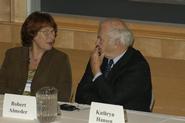
The student organization Biology Matters hosted a panel titled "Stem Cell Therapy: The Science and the Controversy" on Friday, Sept. 30, as part of the Science Center dedication weekend. The panelists were Susan Bryant, P'08, dean, School of Biological Sciences, University of California, Irvine; and Robert Almeder, the McCullough Distinguished Visiting Professor of Philosophy at Hamilton.
Bryant spoke first, and began with an overview of stem cells and their potential advantage to human health. Stem cells are relatively unspecialized cells which continually reproduce themselves, and under appropriate conditions can differentiate into specialized cells of one or more types (such as brain, heart, or pancreas cells). By growing stem cells in culture, scientists are able to create lines of cells that will develop into certain kinds of cells, which could be very beneficial in helping to heal that certain body part in patients. "Eventually, we need to give a little boost to our own bodies to help them heal better," said Bryant. Stem cell lines can also be used to study diseases and do drug screenings.
Bryant went on to discuss the two different kinds of stem cells, adult and embryonic, and explained that embryonic stem cells are much more beneficial than adult stem cells because they never age or collect damage. However, using embryonic stem cells brings up many ethical and religious debates that led to a federal ban in the United States on making new stem cell lines. To make an embryonic stem cell line, scientists must remove a clump of stem cells from a four to ten-day old embryo, at which point the cells have not differentiated into different body parts of systems. The cells are split into dishes to become certain stem cell lines.
Opponents of stem cell research using embryonic stem cells argue that at this stage an embryo is already a human being, and extracting these cells, which stops development, is essentially a form of murder or abortion that should not be allowed. Bryant's response to this argument is that at the point of extraction of stem cells, an embryo has no individuality; all of the cells are the same and have not differentiated. The embryo still has the possibility of splitting and becoming twins. Therefore, it is not yet an individual human being.
The federal government placed a ban on creating new embryonic stem cell lines as of August 2001, and of the only 22 stem cell lines approved in the United States, many are contaminated. "The ban stifled stem cell research," said Bryant, "The Federal government closed down stem cell research while the rest of the world is going ahead." She noted that California passed a proposition that allowed $3 billion of stem cell research, and other states seem to be following their lead.
Almeder began his presentation by saying that there were six reasons for the ban on stem cell research and "I don't think any of them are sufficient." The first objection he discussed was the ethical argument stated above, that destroying an embryo is destroying a human being. Almeder pointed out that this view is generally religious in nature and is along the same lines of protesting abortion. "In a democratic society its one thing to respect others religious views, but its also a good thing to put the shoe on the other foot," he said. In this sense, the ban reflects an imposition of religious views on the rest of the country.
Almeder then discussed the fear of some people that we are now at a
point where we are not far off from engineering higher order human
traits, such as intelligence, and this brings about many ethical and
social objections. Some argue that if scientists engineer traits, there
will be a perceptible loss of responsibility for ones behavior, in the
sense that people's actions will be a direct results of the way they
were "engineered." Some believe it will create more of a separation in
class, because only the rich will be able to afford such treatment.
"People are afraid of taking away human freedom," said Almeder.
However, "It is not clear that any of these things would happen," he
said, "It's a shame that these reasons have to be used to ban stem cell
research." He went on to say that "It seems clear this work is going to
be done anyway," using donations by private investors, and offered the
opinion that it would be much safer if it were sanctioned by the
government.
-- by Laura Trubiano '07
Posted October 3, 2005
